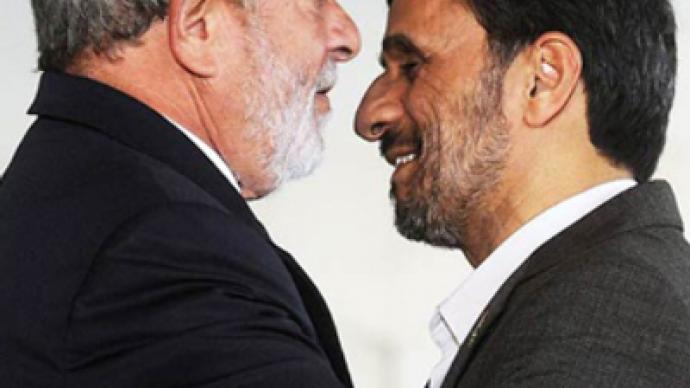Brazil’s Middle Eastern adventure

Brazil’s President Lula is searching for peace in the Middle East. Hugging Iran’s Ahmadinejad and driving for dialogue with all the regional players, his talks have set Brazil into uncharted territory.
“The most popular politician on earth,” as Barack Obama dubbed Brazil’s President Lula, has forged a friendship with Iran’s President Ahmadinejad. On November 23, Mahmoud Ahmadinejad was welcomed to Brazil with a hearty bear hug from the Brazilian.
In hosting President Ahmadinejad, President Luiz Inacio Lula da Silva is engaging Iran without preconditions. This openness is in stark contrast to the US and EU policy to isolate Iran over its disputed nuclear ambitions.
“It won’t work to leave Iran isolated,” Lula said on “Breakfast with the President”, his weekly radio show. “If Iran is an important actor in this strife, it is important for someone to sit with Iran, to talk with Iran.”
Smiles instead of threats
By greeting Ahmadinejad with smiles, Lula is developing a relationship beyond the diversified bilateral trade and visa-free travel issues on the agenda into something altogether idealistic. “I work for the building of peace in the world. I defend peace in the Middle East,” he said at a press conference following their three-hour meeting.
Rather than the threats of sanctions sought by the US, Lula called for an easing in the tensions surrounding Iran’s international relations. In exchange, President Ahmadinejad – the first Iranian president to ever visit Brazil – backs the right of the world’s fourth largest democracy to a permanent seat on the UN Security Council.
President Ahmadinejad welcomed Brazil’s participation in Middle Eastern affairs. “It can help promote peace and stability,” he said after the discussion and claimed they shared a foreign policy based on a humanitarian perspective.
The nuclear issue
Oil-rich Iran’s current international problems center on its nuclear ambitions, which it states are purely peaceful. These claims are disputed by Israel, as Ahmadinejad has openly stated his intention to “wipe Israel off the map”.
Regional tensions are high. On November 22, Ahmadinejad’s air force played a war game to defend their nuclear facilities from a potential Israeli attack.
In addition, Lula has defended Iran’s right to enrich uranium for peaceful purposes, as long as it does not break international rules. Speaking on Brazil’s “O Globo” TV news on Sunday, Ahmadinejad spoke of cooperation. He said: “We can build partnerships to build nuclear plants.”
A distinctive voice
This inclusivity undercuts the West’s hard-line policy to the Iranian nuclear program. Lula has emerged with a distinctive voice among the major international powers. Brazil’s economic power and political leadership in Latin America give it resonance.
The Brazilian has sought the role of mediator, a position that is respected by leaders as diverse as Iran’s Ahmadinejad and President Shimon Peres of Israel.
Trust from Israel
Just in November, Lula also hosted President Mahmoud Abbas of the Palestinian Authority and Israel’s President Shimon Peres, as well as Ahmadinejad.
Lula said on Breakfast with the President: “They are three countries in conflict and have great responsibility for peace in the Middle East.”
Peres became the first Israeli leader to visit since 1966, a sign of Brazil’s new-found influence. Following a trip to set up Peres’ arrival, Israeli Foreign Minister Avigdor Lieberman said, “I think that Brazil, more than any other country, can try to convince Iranians to stop their nuclear program and, of course, to convince the Palestinians to start direct talks.”
In March 2010, the Brazilian expects to strengthen his mediator role. He plans return trips to Israel, Iran and the Palestinian territories, as well as visiting Jordan and Syria to understand a broader range of viewpoints.
Rubbing up against the US
A strong Brazilian engagement in diplomatic issues in the Middle East and Latin America has led to areas of disagreement with the US.
Brazil has criticized the US for its role in the Honduran crisis following June’s coup. Lula took an active diplomatic role, which diverged from the US position.
There have been further differences over US use of military bases in Colombia. Brazil’s Foreign Minister Celso Amorim described the presence of foreign military bases in the region as “not something we see as positive.”
Despite the differences, he said (on November 26, AP) that “We continue to talk on all these issues. It isn’t always necessary to agree. All are extremely friendly contacts.”
Peace through talks and football
Lula believes that all the participants in the conflict must be involved in its resolution: “It is necessary to establish a dialogue, a very serious policy talk, so that you can then believe it is possible to establish peace in the Middle East.”
One of his goals is for the Brazilian football team to play a joint Israel-Palestine team in March. On Breakfast with the President, he said that it would be “an extraordinary achievement for Brazil and, above all, a very important sign for peace.”
Ahmadinejad certainly has faith in Lula. He believes in a partnership between his country and Brazil. He told O Globo: “The two can work together to help create a new international order.”
Jonathan Stibbs for RT













